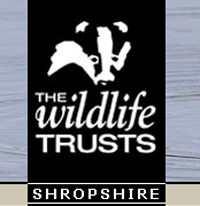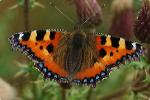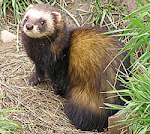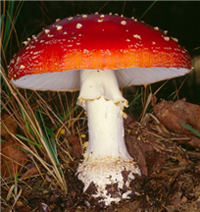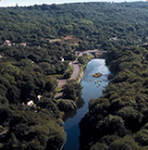Piles of premature shrivelled leaves have washed up in the corners of the yard as the dying lashes of Hurricane Katia made a mess of the golden turning of the season. A late summer tidy uncovered a common frog, the coils of chicken wire encrusted with weed had created a cool damp hideaway, the congregating slugs unwittingly gathering for their communal contribution to our frogs pre-winter fattening. In the coming weeks our frog will search out a more permanent hibernation refuge and I will need to be careful to leave well alone any likely piles of stuff.
Weasels, stoats, pine martens, mink and otter are all members of the Mustelid family. On a recent foray along a small brook south of Telford we found an otter spraint or dropping on a bridge pier. The dark faeces twisted at one end contained fish scales and bones, and smelt strongly of the same. Otters are notoriously difficult to observe but other members of the family can be seen more often. The polecat or polecat ferret on the Rednal Straight had not made it across the road and though dark furred, insufficient remained of its characteristic creamy masked face for me to be finally certain about its identification. Ferrets are domesticated polecats, tending to be much lighter in colour and lacking the distinctive Zorro eye flash. Enough ferrets have escaped into the wild and interbred with the native polecat to create an endless spectrum of variations in between, the so called polecat ferrets. Polecats are mainly nocturnal, though can be seen hunting prey such as voles, mice and frogs, and though usually solitary can gather in sociable family groups. Polecats have few natural predators though like mine they are often killed by cars. At this time of the year their fur, known as fitch, grows denser and paler and the family units break up for the winter. The polecat has survived centuries of persecution and now out of it Welsh heartland this nifty predator is on its way back.
The Fox seen at Elbridge will also be in a seasonal mood. As autumn progresses the family groups formed to rear and protect the young cubs break up. Sub adults may stay with their parents, whilst young males disperse; in rural UK this can mean distances up to 25 kilometres, in urban areas as little as 3 kilometres. Dispersal will end around Christmas, though in disturbed territories final settling may not occur until the following summer. Life expectancy is low for these wandering youngsters. The tendency to disperse has been related to the amount of grooming the cub received whilst within the family and aggressive behaviour towards the cub as the group moves through the year. Foxes can not only be seen active during the day, the leftovers from their meals can also be found. Neatly consumed duck carcasses with the primary wing feathers still attached or with the ends sheared. The female rat found dead on its back in the garden had been killed by a bird of prey the small wound at the throat not a foxes M.O. at all.
Whilst the local wildlife manoeuvres in small ways to anticipate the coming winter our summer bird visitors are far, far away! R. has been tracking one of five cuckoo’s satellite tagged by the British Trust for Ornithology. The tags are solar powered, fixed to the cuckoos during a ringing operation in the Thetford Forest and since released back in June the birds are now in sub-Saharan Africa. Clement, Martin, Lyster, Kaspar and Chris are the first cuckoos to be tagged in this way and you too can follow their progress at the BTO website http://www.bto.org/science/migration/tracking-studies/cuckoo-tracking
Finally, trying hard not to miss the accelerated autumn we visited Nant y Frith woods near Coed Poeth on Sunday morning, and on the back of a gorgeous ramble I advise you all to take yourselves to your favourite woods too and kick up the dried pages of another summer.
Happy wildlife hunting, Pete.
If you would like to share your nature notes my email is petewoodman@thewoods12.fsnet.co.uk
1 Oct 2011
Subscribe to:
Comments (Atom)




